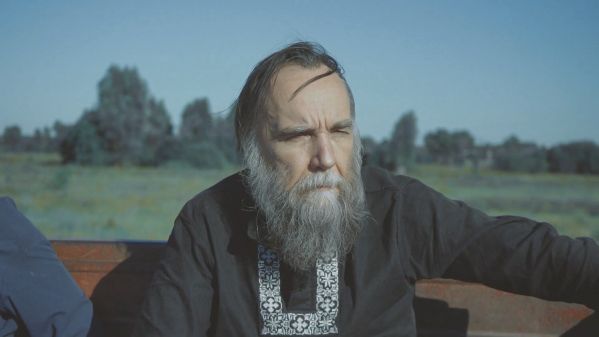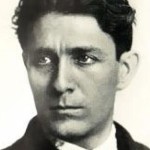1. Evola i Guenon to wzorcowe postacie tradycjonalizmu. Im więcej czasu mija, tym bardziej pokaźny kształt przybiera dzieło Włocha. Żaden z guenonistów – Burkhardt, Valsana, Schuon, nie wspominając o mniej istotnych, nie może choćby względnie równać się Evoli. Guenoniści powszednieją, stali się konformistami i masonami albo wpadli w niedorozwinięty umysłowo „new age”, lecz przypadek Evoli pozostaje pomnikiem ducha w tej ciemnej epoce.
2. Gdy trzeciopozycyjne reżimy odchodzą w przeszłość, mniej uwagi poświęcamy partyjnym działaczom i przywódcom, lecz postaci takie jak Evola jaśnieją coraz bardziej. I to wzejście wciąż trwa. Za dwadzieścia lat usłyszymy, że Hitler i Mussolini byli politykami, którzy żyli w erze Evoli oraz Heideggera -i podzielali (częściowo i na prymitywnym poziomie) ich poglądy.
3. Gwiazda Evoli wschodzi nad XXI wiekiem. Nowy tradycjonalizm wynika z jego uważnej i głębokiej lektury. Naszym zadaniem jest odczytać Evolę inaczej, na nowy sposób. Co to znaczy? Postarajmy się nakreślić kierunek owego odczytu jego tez.
4. Po pierwsze: Evola – tradycjonalista bez Tradycji. Możemy stwierdzić, że sam jest sobie winien, lecz nie będzie w tym nic odkrywczego. Zobaczmy w tym jego zasługę. Tradycja jako semantyczna matryca pretendująca do posiadania bezpośredniego dostępu do denotatywnej mnogości Tradycji – unikając specyficznych tradycji z ich systemami denotatywno-detonacyjnymi. Jesteśmy przekonani, że ta denotatywna mnogość Tradycji, której nie widać z poziomu większości tradycji, a która jawi się jedynie z punktu widzenia tradycjonalizmu, jest tą samą co w przypadku neoplatonizmu. Potwierdza to estyma jaką Evola darzył Plotyna. To, co niejasno nazywa „zachodnią tradycją” – jest neoplatonizmem. I jest tradycjonalizmem. Tutaj zgadzamy się w pełni z tezą Marka Sedgwicka o odrodzeniowych źródłach teorii Sophia Perennis, aczkolwiek neoplatonikami w żadnym razie nie byli Ficino czy Pico della Mirandola.
5. Po drugie, Evola obstawał przy centralnym znaczeniu doświadczenia transformacyjnego, to jest: praktyki inicjacyjnej. To ważne. Bez podstawowego przekształcenia istoty człowieka, nie ma mowy o Tradycji. To oczywiste nawet naocznie: mówić o tradycjonalizmie to prezentować bardzo specyficzne dane egzystencjalne. Tradycjonalizm to nie temat dla przegrańców, to sprawa arystokratów. Od człowieka, który prawdziwie doświadczył otchłani, emanują szczególne promienie (jak z Jewgienija Gołowina), których nie można z niczym pomylić . Jeżeli te promienie nie dobywają się, z takim nie ma o czym mówić. Tłuszcza trzyma się z dala od Ezoteryzmu. Evola oferuje tłumowi odejście lub ryzykowną próbę uszlachetnienia. Doświadczenie przekształcające to widzialny, namacalny znak. Evola pytał o niego przy wejściu. Rodzaj wejściówki do tradycjonalizmu. Evola, odczytany na nowo, antyscholastycznie: nie możesz oszukać nikogo. By otrzymać złoto, musisz je mieć. Podstawa selekcji? Sąd Boży. Wrzucamy człowieka do rzeki z kamieniem młyńskim u szyi, jeśli wypłynie – jest wart, Axios! Utonie – jednego bękarta mniej.
6. Po trzecie: Tradycjonalizm nie jest prawidłowy bez polityki. Kto mówi inaczej, jest baranem i łajdakiem. Żyć w świecie i być zadowolonym z antytradycji oraz peryferalnych halucynacji o Hyperborei i Złotym Wieku – to nie ma prawa działać. Jeżeli jesteś tradycjonalistą, zmień świat, wyzwij otaczający cię brud: demokrację, prawa człowieka, liberalizm, materializm, egalitarne ideały i partie, i zmieć je z powierzchni ziemi. Zwyciężaj lub giń. Nowa droga: to już nie tylko jęczenie o tym, że „biedni Kszatrijowie pod koniec Kali Yuga zawsze się mylą”, lecz pistolet maszynowy, stacja kolejowa, punkt zapalny lub komórka rewolucyjna.
7. Po czwarte: Evola czytany z lewa. Nie z punktu widzenia egalitaryzmu, progresywizmu i humanizmu, taka interpretacja jest niemożliwa. Poprzez „z lewa” rozumiemy: przeciwko burżuazji, kapitalizmowi i liberalizmowi. Nie jest to kwestia przedmiotu. Evola napisał „Orientacje” i „Człowiek pośród ruin”, które czynią to jasnym: burżuazja jest lepsza niż proletariat, a kapitalizm jest lepszy niż socjalizm. To jest pomyłka Evoli (oparta na błędzie Guenona). Istotą błędu jest utożsamienie trzeciego stanu z trzecią kastą (Waiśja) i trzecią funkcją (Dumézil), a proletariatu z czwartą kastą (Śudra). Błąd. Trzecia kasta to chłopi i rzemieślnicy z obszarów wiejskich. Mieszczaństwo, burżuje i proletariusze, zrujnowani chłopi, którzy przenieśli się do miast nie są ani trzecią, ani czwartą kastą. Tak jak kupcy, są to społeczni degeneraci. W Indo-Europejskim społeczeństwie nie ma kupców, ani obywateli, ani proletariuszy. Wszystkie te ludzkie symulakry wyłoniły się jako pasożyty na peryferiach fortec Kszatrijów, zamków służących zbieraniu podatku (nazywamy je miastami). Kapitaliści – nosiciele kontrinicjacji, i proletariat – zdegradowani chłopi. Powinniśmy być po stronie chłopów, nawet zdegradowanych, przeciwko bękartom: kupcom i bankierom. Tradycjonalizm to rewolucja przeciwko współczesnemu światu, a współczesny świat został stworzony przez przekupki, nie socjalistów i chłopów wywłaszczonych wczoraj, uwięzionych w miastach i zniewolonych przez wampirzą burżuazję. Współczesny świat -burżuazyjny. A upadek ZSRR pokazuje, że Guenon i Evola mylili się. Zwycięzcą na końcu Kali Yuga zawsze jest ten najgorszy. I nie ma nic dobrego w komunistach, ale są o niebo lepsi od liberałów. Nowe odczytanie Evoli: wczesny nihilistyczny dadaizm i późny prawicowy anarchizm („Ujeździć Tygrysa”), to jest wyjście dla lewicowego evolianizmu.
8. Po piąte: Evola i temat Radykalnego Podmiotu. Fakt, iż Evola jako tradycjonalista bez tradycji może być odczytany w kontekście nowej metafizyki. Nowa metafizyka po stronie tradycji, przeciwko nowoczesności i post-nowoczesności, lecz pojawia się nieprzyjemne pytanie: jak Tradycja, która jest wszystkim, może tolerować smród dnia dzisiejszego? Coś jest nie tak z Tradycją. Ustanowienie koncepcji Radykalnego Podmiotu, który jest źródłem tradycji i jako taki jest indyferentny wobec dowolnego paradygmatu. Radykalne eksperymenty z Evolą zbliżają nas do rozwiązania. Evola – zwiastun nowej metafizyki. To jest zupełnie nowe.
9. Evola w świecie. Ahmadineżad stwierdził ostatnio: „nie głowice nuklearne, ani żadna ilość wydrukowanych dolarów, tylko idee mają znaczenie”. A gdy nadejdzie Mahdi, wszystkie chimery tego świata umrą jednocześnie. Będzie to o wiele gorsze niż światowy kryzys finansowy. Evola – to jest idea. Jasno określona, błyskotliwa, ziejąca ogniem idea. Tak, to jest uniwersalna broń. Wszyscy, którzy myślą, będą musieli dotknąć Evoli. Nikt nie będzie ponosić odpowiedzialności za skutki.
10. I ostatnia rzecz: Evola w Rosji. Tak jak wszystko inne w Rosji, czy Evola nie-evoliański, to smutny temat. Arystokraci są uczeni przez urodzonych lizusów, piękno jest oświetlane przez dziwaków a literatura nauczana przez tych, którzy po prostu nie potrafią czytać. Guenon nazwał Rosjan naśladowcami. Naukowe wyjaśnienie tego stanu rzeczy znajduje się w książce „Martin Heidegger: możliwość rosyjskiej filozofii”. My – nosiciele „logos notos”, niewłaściwego Logosu. Evola nie jest dla nas. Nic dziwnego, że studiują go tylko krzywi dziwacy (jak wszystkie inne wielkie, proste rzeczy). To jest nasze przeznaczenie. Należałoby zakazać czytania Evoli komukolwiek. Z pożytkiem dla znajomości języków. Jest prosty do przetłumaczenia, ale jego idee nie są zrozumiałe w każdym języku. A jeszcze ciężej jest nimi żyć. Jeśli nie chcesz lub nie możesz zrozumieć i żyć, nie da się z tym nic zrobić. Dawalibyśmy książki Evoli tylko tym, którzy potrafią zdać szczególne testy. Tak jak było w ZSRR w latach 70′ i 80′. Przed zbliżeniem do Evoli, należy dokonać oczyszczenia z proletariatu, piętna bękarctwa i burżuazji. Musimy stworzyć hermetyczny krąg, chroniąc Evolę i jego idee przed zaniedbanymi, niechlujnymi przegrańcami.
Aleksandr Dugin
Zdjęcie: countere.com

Źródło: Xportal.press








24 czerwca 2024 o 01:03
Znalazłem na lapciu anglojęzyczną wersję (w oparciu o nią prawdopodobnie powstało to tłumaczenie, jak sądzę), której nie mogę jakoś już znaleźć w necie. Enjoy!
SECTION IV. „THE MISSION OF JULIUS EVOLA”
1. Evola is a paradigmal figure of traditionalism, along with Guenon. The more time passes, the more impressive his shape. None of genonists – T.Burkhardt, M.Valsan, Shuon, not to mention less important, could not even be compared to Evola. Genonists are becoming commonplace, conformists and Masons or are falling into a weak-minded „new age”, Evola’s case remains a monument of spirit in the dark ages.
2. As soon as the third way regimes become a thing of the past, we are less aware of party functionaries and even the party leaders, and shine brighter figures such as Evola. And it is on the rise. After 20 years we will hear of Hitler and Mussolini – political figures who lived in an era of Evola and Heidegger, and sharing (at a primitive level, and partly) their ideas.
3. Evola’s star rises over the XXI century. The new traditionalism stems out from his close and deep reading. Our task is to read Evola otherwise, in a new way. What does it mean? Let us try to outline the direction of this reading of the theses.
4. First: Evola – „traditionalist without Tradition”. We can say it’s his fault. But one should see in it his merit. „Traditionalist with no Tradition” means that he deals with a Tradition as with a semantic matrix and pretends to have direct access to the denotative multitude of Tradition; thus he can- avoid the concrete tradition and pass to the system of relation denotant-detonant in the realm of the pure methapysical correspondences. We are convinced that this is denotative multitude of Tradition, which you can not see in most Traditions, and which is visible only from the standpoint of traditionalism, the same as the Platonic topic. Evola’s sympathies to Plotinus confirm this. What he vaguely calls „western tradition” is neo-Platonism. And it’s traditionalism. Here, We are fully agree with Mark Sedgwick’s thesis about Renaissance roots of the theory of Sophia Perennis, although Neoplatonism was by no means founded by Ficino and Pico della Mirandola and only rediscoverd by them in new historical conditions.
5. Second, Evola insisted on the centrality of transformative experience, that is initiatory practice. This is important. Without a basic transformation of the very essence of human beings, there is nothing to talk about Tradition. It’s obvious even visually: talk about traditionalism – so demonstrate some very specific existential data. Traditionalism is not a business of losers, it is a business of aristocrats. From a man who had a real experience of the abyss, emanate quite specific rays that can not be confused with nothing else (as was the Eugene Golovin’s case). If these rays do not emanate, there is nothing to talk with a person. Let the mob stay out of Esotericism. Evola invited the mob to go out or to try to stake on risky attempt of ennoble. Transforming experience is a visible, tangible mark. Evola asked to show it at the entrance. A kind of face control for access to traditionalism. Evola, read in a new way, serves us to judge any pretentions for the esoteric knowledge. They can’t fool us anymore. They should produce the mark od the abyss first. If not they are fired. To make gold, you must have it. The basis of selection – ordeal, we throw person people into a river with a millstone around his neck, will he pop up – it means he’s worthy (axios!), won’t he swim out – there will be one bastard less.
6. Third: Traditionalism is not valid without the policy. Who claims the contrary is a ram and a scoundrel. Live in the world and be content with antitradition and peripheral hallucinations of Hyperborea and the Golden age, this will not work. If you are traditionalist, change the world, challenge the surrounding filth: democracy, human rights, liberalism, materialism, egalitarian ideas and parties, and erase them from the face of the earth. Conquer or die. A new way: it is not just whining about that „poor Kshatriyas in the end of the Kali Yuga are always wrong”, but a tommy gun, train station, a hot spot or a revolutionary cell.
7. Fourth, Evola is to be read from the left. Not from the standpoint of egalitarianism, progressivism and humanism, such an interpretation is impossible. By the left I mean against the bourgeoisie, capitalism and liberalism. This is not a matter of course. Evola has „Orientations” and ” Men Among the Ruins”, which make it plain: the bourgeoisie is better than the proletariat, and capitalism – than the socialism. That is Evola’s mistake (based Guénon’s error). The essence of the errors is in the identification of the third estate with a third caste (Vaisya) and the third function (y Dumézil), and the proletariat with the fourth caste (Sudras). Wrong. Farmers – third caste, Vaisyas and only the peasants and small artisans, who live in rural areas. Towns people / bourgeois and proletarians / ruined peasants who migrated to the city are not the third or fourth caste. Both are social degenerates, as merchants. In Indo-European society, there are no merchants, nor citizens, nor proletarians. All of these simulacra of people emerged as parasites on the periphery of Kshatriyas fortresses designed to collect taxes (we call them cities). Capitalists – counter-initiation’s media, and the proletariat – degraded peasants. It should be with the peasants, even degraded, against the bastards merchants and bankers.
Traditionalism is a revolution against the modern world and modern world was created by hucksters, not by the socialists and the poor deterritorialized former peasants, trapped in the city and enslaved by vampires-bourgeois. The modern world is bourgeois. And the fall of the USSR shows that Guenon and Evola were wrong. The winner at the end of Kali Yuga is always the worst. There were nothing particulary good in Communism, but the communists were nevertheless much better than liberals. New reading of Evola presumes the turn to his early nihilistic dadaist period and to his late right anarchism („Ride the Tiger”), do it is invitation to the creation of „left evolaism” – „Evola visto di sinistra”.
8. Fifth, Evola and the theme of Radical Subject. The fact that Evola was traditionalist with no tradition can be read in the context of the new metaphysics. New Metaphysics on the side of tradition against modernity and post-modern, but it is given an unpleasant question: How Tradition, which is allmaighty and true, could allow the decadent Modernity to come to existence? Something should be worng with it. And here emerges revolutionary idea of Radical Self, which is the primordial source of Tradition, and beeing primordial he is indifferent to any paradigm — to golden age ot to Kali-Yuga. Radical experiments suggested by Evola (in „Introduzione alla Magia” for example) bring us close to this topic of Radical Self. Evola becomes the herald of the New Metaphysics.
9. Evola in the world. Ahmadinejad recently said, „not nuclear warheads, and no amount of printed dollars, only ideas do really mean.” When the Mahdi comes, all these chimaeraswill collapse at once. It will be worse than the global financial crisis. Evola – is an idea. Clearly set out, brilliant, fire-breathing idea. So, this versatile weapon. All those who think have to touch Evola. No one will bear the responsibility for the consequences.
10. Last: Evola in Russia. Like everything else in Russia it is a sad topic. Aristocrats are studying by congenital toadies and beauty is illuminates by freaks, the literature is taught by those who simply can not read. Guenon called the Russian „imitators”. The scientific explanation of this can be found in the Alexander Dugin’s book „Martin Heidegger: the possibility of Russian philosophy.” We, Russians, carry „logos nothos”, „improper Logos” mentioned by Platon in „Timeas”. Evola, therefore, is not in honor by us. No wonder mostly twisted freaks are studying him (like all the other great straight things ). This is our sad destiny. We would strongly disapprove anyone reading Evola in Russian without proper preparation. Much better is ti try read him in foreign languages. His texts are relatively easy to translate. On the contrary, his ideas are not so easy to understand in any language. And even harder to live. And if you do not want to or can not understand or live them, it is better to leave them alone. We would give the book of Evola only to those who could pass certain tests. As it was in the 70s and 80s in the USSR. We must protect our margaritas from porcos. Before proceeding to Evola, one must be cleansed of the proletarian slavery nature, of bastard’s atttitudes, of logos nothos, of bourgeois greed for consomation. We must create a hermetic circle, preserving Evola and his ideas from unworthy loosers and marginals. The real richeness is only for really rich people.